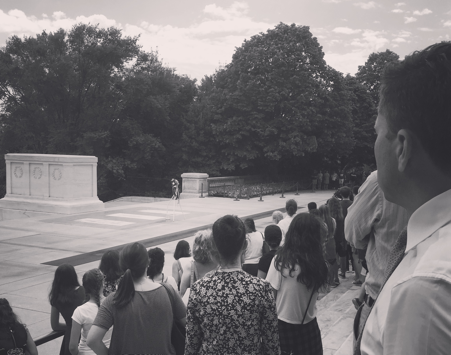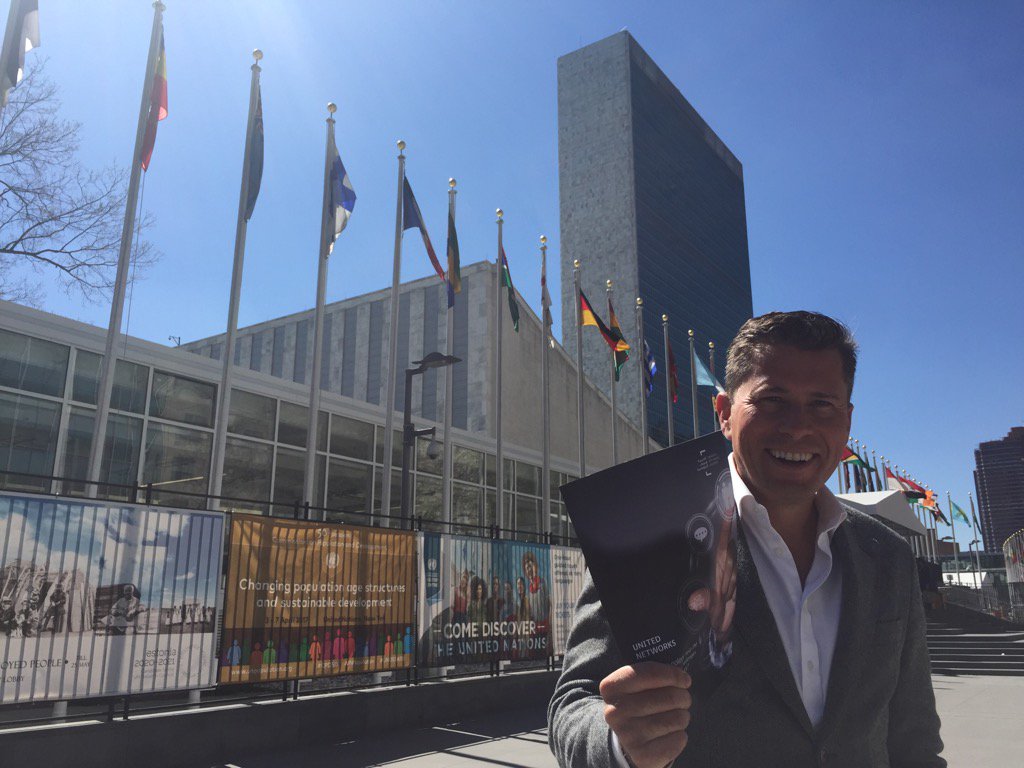- Posted on : April 26, 2017
- Posted by : Tom Fletcher
Last week I was in New York to launch a new report on how technology can transform the UN. You can access the whole report here. See also the pieces on this on StepFeed and the Centre for Public Impact. The report is different in that the ideas were generated by young people, tech gurus and activists – it aims to help the UN react to both the challenges and opportunities of digital technology.
Later in the week I visited Arlington Cemetery. At JFK’s grave, the words from his inauguration are etched in rock: “man holds in his mortal hands the power to abolish all forms of human poverty and all forms of human life … the torch has been passed to a new generation … unwilling to witness or permit the slow undoing of those human rights to which this nation has always been committed today at home and around the world … if a free society cannot help the many who are poor, it cannot save the few who are rich … to that world assembly of sovereign states, the United Nations, our last best hope in an age where the instruments of war have far outpaced the instruments of peace, we renew our pledge of support - to prevent it from becoming merely a forum for invective - to strengthen its shield of the new and the weak - and to enlarge the area in which its writ may run … let us never negotiate out of fear. But let us never fear to negotiate … Now the trumpet summons us again - not as a call to bear arms, though arms we need - not as a call to battle, though embattled we are - but a call to bear the burden of a long twilight struggle … against the common enemies of man: tyranny, poverty, disease and war itself”.
These are compelling statements. And pretty timeless. I hope someone showed them to President Kennedy’s successor when he met the UN Security Council yesterday.
There is a great story about JFK’s visit to NASA. As he left, he asked the guy cleaning the steps what he was doing. ‘I’m putting a man on the moon’. An organization needs a strong sense of purpose, that can be articulated and delivered by all its people, and understood by all those it reaches. The same goes for the UN. Especially at a moment when it is the best place we have to battle for those ideals that JFK spoke about on 20th January, 1961: against tyranny, poverty, disease and conflict, and for human rights, freedom and peace.
To build the impact of the United Networks report, each week we will be focusing on one of the questions in it. We want to develop a discussion driven by the public - an effort to crowdsource the best thinking on an issue that has an impact on all of us. So, with JFK and NASA in mind, first up is an effort to work out what the UN is really for.
I’ve written elsewhere on this site about the weaknesses of the UN; in March 2015 & more recently in September 2016. It is imperfect, and too often the Security Council has indeed become “a forum for invective”. But in the report we’ve concluded that it is still the greatest force for good in the world. Across its ambitious range of functions, from peacekeeping to disaster relief to climate change, it is mandated by the world’s nations to take on the tasks that they alone cannot. It marshals the best instincts of humanity against the worst.
At a time of massive prosperity, inequality continues to rise, unleashing the spasms of anger we are seeing at the ballot box and on our streets. It is this extremism, in all its varieties, that is our biggest threat in 2017. It is getting harder to hold the territory that extremists of all nations and faiths attack, where individual rights are cherished and diverse communities interact. This space has been built by humanity with immense patience and sacrifice. The institutions created to protect it are being tested, maybe to destruction.
The threats to the post 1945 international order feed on each other: an economic crash; the nationalist promise of greatness and taking back control; the gradual undermining of institutions; intimidation of the independent media; the building of a personality cults; challenges to truth and facts; and the systematic removal of checks and balances. At each of those moments, those aiming to undermine international rule of law hope that we stay silent, argue among ourselves, or become distracted.
So what can the UN do in response? The great dividing line of the 21st century is between two basic human instincts – to fight for resource, or to negotiate for it. We need the UN more than ever because the implications of the UN’s failure are more catastrophic than ever.
That is our starting point in the report, but is it the right one? Do you agree? Disagree? What’s your definition of what the UN should be in the 21st century? Does the UN Charter still get it right? Would you fight for the ideas in the Universal Declaration of Human Rights?
Please join the conversation at http://unitednetworks.ae/questions-listing/. We are going to feed the best ideas into the final version of the report in the Autumn.
The subject of peacemaking feels more pertinent in the week we lost Lord Michael Williams. I worked with Michael in his time as a Foreign Office adviser under Jack Straw, a No 10 adviser under Gordon Brown, and - most intensively - when he was UN Special Coordinator for Lebanon, a role that includes standing between Israel and Hizballah. This is one of the toughest and most critical jobs in the international system, requiring huge tact, resilience and judgement. Michael had all of that in abundance, plus great expertise, tenacity and good humour. As a result he was a great peacemaker, peacekeeper and human.
I recommend Terry Waite’s Inheritance Tracks, which aired by coincidence as Michael was dying. He talks with his characteristic energy of his time as a hostage in Lebanon, and the vital role played by peacemakers.
Those who wrote the UN Charter understood that. So did JFK. So did Michael Williams.
A final thought. I don’t think any beatitudes for diplomats exist, so in tribute to Michael, and all diplomats and citizen diplomats walking towards the sound of gunfire and working “ against the common enemies of man", here is a tentative first draft of some:
Blessed are those who find consensus in a time of arguments.
Blessed are those who build bridges in a time of walls.
Blessed are those who strive for expertise, patience, perspective, honesty and judgement in a time of fake news, soundbites and echo chambers.
Blessed are those who aspire to be courageously calm and tolerant in a time of outrage and intolerance.
Blessed are those who never negotiate out of fear, but never fear to negotiate.
Blessed are those who are internationalist in a time of nationalism, Blessed are those who are open minded in a time of closed minds.
Blessed are those who offer a worldview from having viewed the world.
Blessed are those who remain curious in a time of certainty.
PS, Michael was not one to take all this quite so seriously. So he would also expect me to provide a link to the ‘Blessed are the Cheesemakers' scene from Life of Brian. RIP.

Photo description: Tomb of the Unknown Soldier, Arlington Cemetery, 21 April
0 Comments

